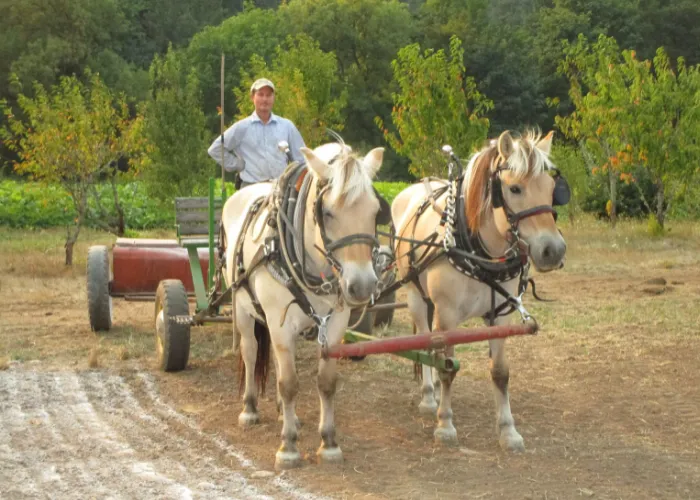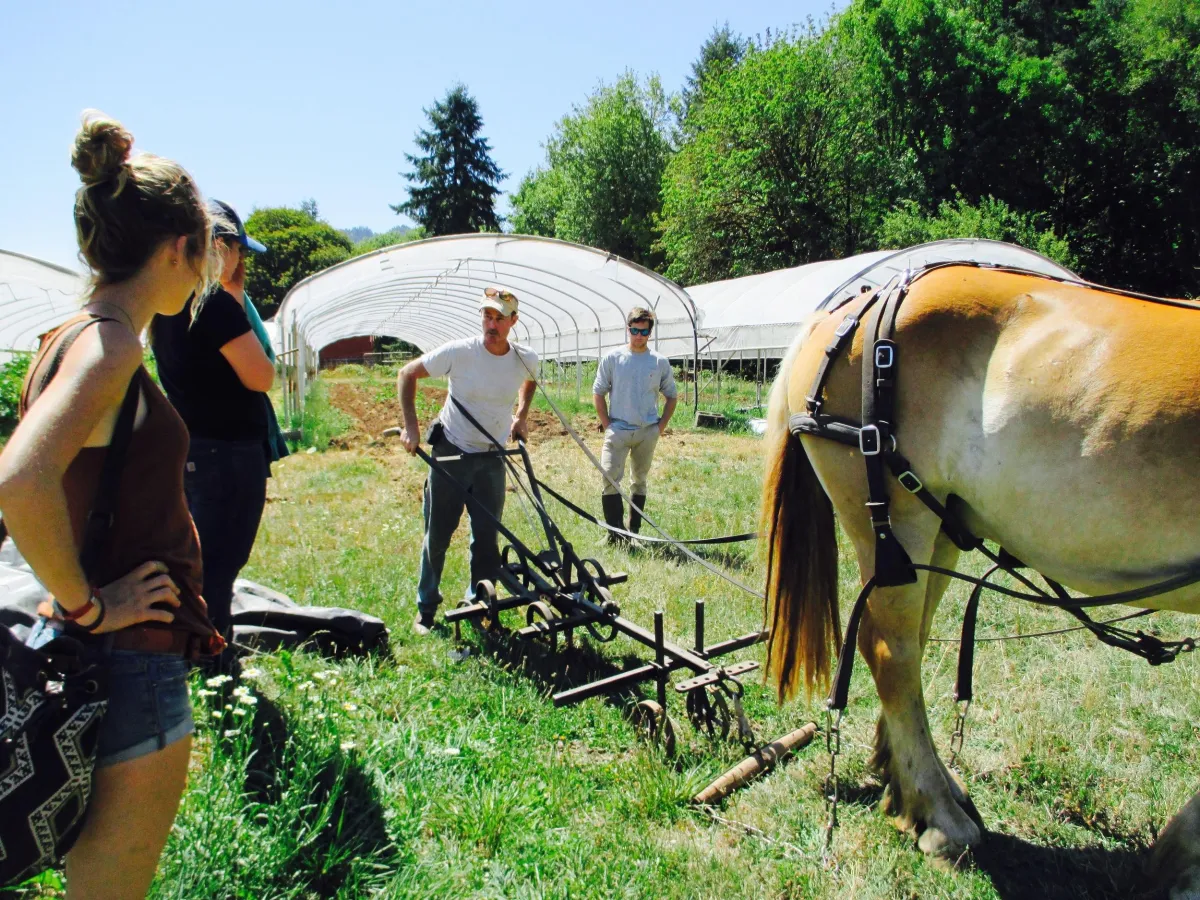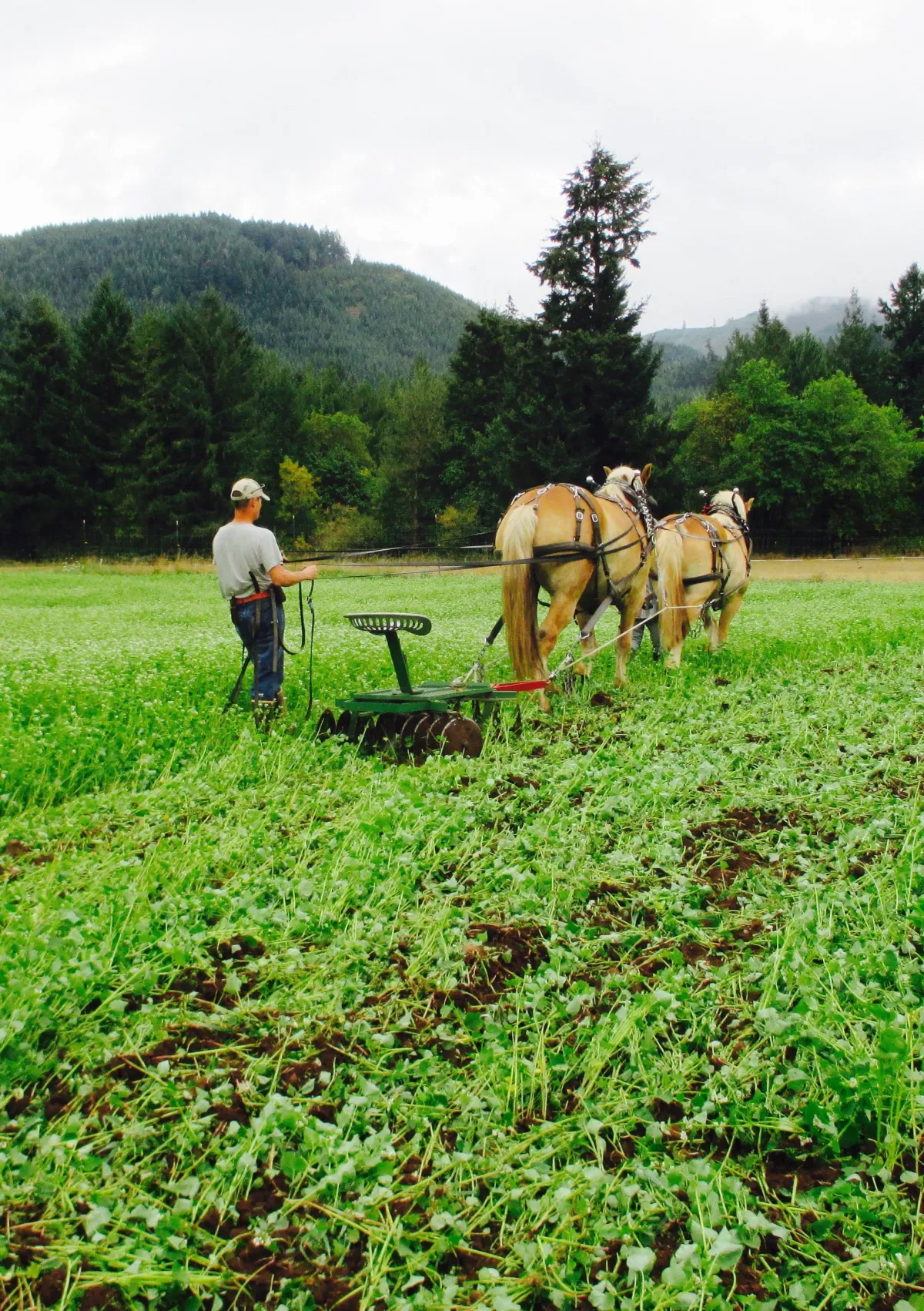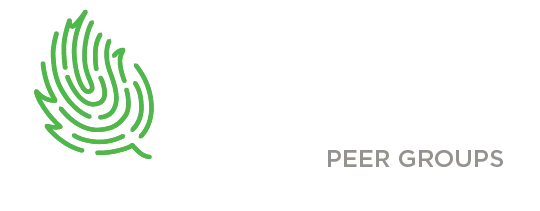SUSTAINABILITY SUCCESS STORIES
Companies with Social and Environmental Policies
Workhorse Workshops

Workhorse Workshops is a draft horse training business located on Ruby and Amber’s Organic Oasis in Dorena, Oregon. Both businesses are owned by Walt Bernard and his partner Kris Woolhouse, who lease some of the farm’s property to three other businesses, none of which consider sustainability as an afterthought.
To emphasize that point, Workhorse Workshops relies upon the farm as part of its draft horse training program. “We couldn’t really do the [type of] workshops I want to do and my customers want to do … without farming,” says Walt. “Workhorse Workshops can’t exist without the farming.”
Nearly 75 percent of the farm’s tillage is done with draft horses. Wheat’s grown on the farm — including through the draft horse training programs — which is then used for chicken feed or sold and turned into flour.
The mindset of minimizing waste and resources is a crucial component of the sustainability practices employed at Workhorse Workshops and is seen in nearly every aspect of the way the business operates.

how sustainability is prioritized at Workhorse Workshops
Walt defines sustainability as “managing our resources, finances, and bodies so that we can continue to use vital resources out of the earth without damaging it or the human spirit and body,” says Walt.
That philosophy is especially evident in the cooperative nature between Workhorse Workshops and the other businesses that operate at Ruby and Amber’s Farm. By sharing equipment, implements, and labor, each business saves not only money, but the resources that would otherwise go into producing, transporting, and operating multiple tools of the same type.
“We want to build depth and strength and resilience in the community and not deplete it in every facet that you can imagine,” says Walt.
Another issue that Walt has noticed in organic farming is the use of plastics, particularly when used as a form of weed control. The result is “acres and acres and acres of plastic waste per year” — waste that, Walt claims, isn’t sustainable, even if plastics are allowed under current USDA organic standards.
Because sustainability is so complex, Walt recognizes that it’s a “moving target to approach as you learn more.” In turn, his decision-making process entails asking:
• What’s good for the farm?
• What’s good for sustainability?
The result is a decision made after carefully considering and weighing both the farm’s needs and options available to promote sustainability.
For example, given the choice between paper feed bags or more affordable plastic feed bags, Walt is more likely to purchase the more expensive — but more eco-friendly — paper option.
the importance of setting sustainable development goals
The Workhorse Workshops’ decision-making process plays a key role in how sustainable development goals are set. Walt’s approach is to categorize these goals based on what’s attainable in the short-term and what can be worked toward long-term.
short-term SDGs
Workhorse Workshops approaches short-term sustainability goals on a day-to-day basis. The aim is to “continuously decrease [the] impact on the earth and all resource levels — its fuel, water, [and] oil,” with a focus on minimizing the effects of pollution and waste.
This is evident through decisions such as choosing paper feed bags over plastic.
Short-term sustainability goals are also accomplished by sharing equipment and implements between the businesses that operate on the farm. “An irrigation pump costs five, six, seven thousand dollars,” says Walt. If each farm was to buy its own pump, “that’s $30,000 where it could’ve been $5,000.”
By purchasing and sharing a single pump, each business not only saves money, but reduces the resources used to produce, transport, and operate five pumps when one shared pump works just as well.
long-term SDGs
Workhorse Workshops’ long-term sustainability goals are less concrete, but Walt’s inclusion in Shelly Robbins’ Meetup group, Success Through Sustainability, has helped him begin to formulate a business sustainability initiative that involves:
• The human resources component
• Long-term management of horse farming and draft horse training
• Educating the community about the sustainability of horse farming and draft horse training
• What to do with the property when he and Kris pass on
The “mini-cooperative” of businesses between Workhorse Workshops and leasees at Ruby and Amber’s Organic Oasis represents one of the more ambitious long-term goals. Creating a larger network — an “economic force” — of businesses with similar sustainability ideals and values is one of Walt’s most forward-thinking initiatives.
A broader network would be a way to affect change, muses Walt, drawing similarities to other groups who’ve found success by banding together. He calls attention to the issues surrounding recombinant bovine growth hormones, in which a grassroots effort was organized to discourage and limit the use of rBGH in milk.
Similar support for sustainability initiatives, Walt believes, could be achieved through education and by building a network of like-minded businesses, organizations, and nonprofits.
He sees convenience and the lack of time as the greatest challenges to growing support for sustainability, a challenge strengthened by regulations — particularly in the COVID era — that discourage or forbid certain sustainable actions, such as using your own container for takeout vs. a disposable styrofoam tray and other paperless options.
“It’s not an insurmountable task,” he suggests, noting that many communities have banded together to succeed at encouraging better sustainability practices. “But it all happens [on a] grassroots basis.”

how meetup supports Workhorse Workshops’ sustainability
Despite being relatively new to the Success Through Sustainability Meetup group, Walt has already recognized the group’s ability to help him network with similar-minded business owners in a diverse array of industries or those who share his experiences but on a much larger scale.
By participating in the Meetup group, Walt has also begun to codify aspects of sustainability that existed only through his implicit thoughts and actions, such as managing human resources and including sustainability in his mission statement.
According to Walt, one of the best parts of the Meetup group is when other members share their sustainable development goals and progress. He also values the different perspectives presented when an issue that resonates with multiple members of the group is discussed.
At the same time, he recognizes the impossibility of being both an activist and a farmer: farming simply takes too much time to allow much room for anything else. Instead, he uses his dollars to support leaders and organizations that reflect his values.
using bookkeeping and payroll services to support sustainability
For both Workhorse Workshops and Ruby and Amber’s Organic Oasis to be successful, they need to be sustainable, claims Walt. He credits Shelly Robbins with helping organize his finances and bookkeeping and emphasizes the importance of finding professionals with experience in sustainable business practices.
To Walt, it’s important that professional service providers understand his mindset and goals of sustainable development. Professionals need to respond to inquiries in a timely manner and possess the capabilities of both understanding the businesses’ finances and sustainability goals and the resulting decision-making process.
“They [the goals] have to be [on] equal footing as the financials,” says Walt, calling back to the paper and plastic feed bag situation. An accountant looking at only the financials of the business would recommend Walt purchase and use the less expensive plastic bag option, whereas an accountant who understands his mindset would support his decision to purchase eco-friendly alternatives, such as paper feed bags.
When it comes to working with a business or payroll service, it’s important to Walt that it shares his values and views on humanity. On top of that, professional services need to support his decision-making process so that he fully understands his business and finances without information and data being obfuscated beyond his knowledge or control.
measuring the true sustainability and eco-friendliness of technology
For all the positives and benefits of technology, Walt takes into consideration its negative side: hidden costs. A great deal of resources goes into the technology he and millions of other business owners use daily, including the very devices that provide access to these services.
Despite the conveniences of modern technology, the concept of embodied energy — the amount of energy required to produce a product or service — plays a role in Walt’s decision-making process.
Though he recognizes that he’s conserving resources by choosing to attend a virtual Meetup over an in-person meeting, he remains cognizant of the resource costs that go into facilitating that virtual meeting, including the electricity used to power computers and the plastics required to produce them, among other resources.
sustainability goals: a moving target, but one worth aiming for
Walt’s recognition that achieving total sustainability is near-impossible hasn’t discouraged him from continuing to learn and improve upon Workhorse Workshops’ sustainability initiatives.
If anything, his introduction to others in his local community and the Imprint Success Through Sustainability (link to Circle?) group has grown and solidified Walt’s commitment to sustainability and his hope of seeing a growing network of sustainability-minded businesses come to fruition.
<< RETURN TO MAIN PAGE

success through sustainability
© 2021 Imprint. All Rights Reserved
Website Design - Dana L. Mason
Powered by - JourneyCARE
